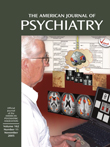Treatment Matching in the Posthospital Care of Depressed Patients
Abstract
OBJECTIVE: This study assessed the efficacy of 1) matching patients to treatments and 2) adding additional family therapy or cognitive therapy in a group of recently discharged patients with major depression. METHOD: Patients with major depression were recruited during a psychiatric hospitalization. After discharge, they were randomly assigned to one of four treatment conditions that were either “matched” or “mismatched” to their pattern of cognitive distortion and family impairment. The four treatment conditions were 1) pharmacotherapy alone; 2) combined pharmacotherapy and cognitive therapy; 3) combined pharmacotherapy and family therapy; and 4) combined pharmacotherapy, cognitive therapy, and family therapy. Randomly assigned treatment continued for 24 weeks on an outpatient basis. RESULTS: Among patients with at least moderate depressive symptoms at hospital discharge, low rates of remission (16%) and improvement (29%) were obtained. Matched treatment led to a significantly greater proportion of patients who improved and greater reductions over time in interviewer-rated depressive symptoms than mismatched treatment. However, matched treatment did not produce greater change in self-reported depression or interviewer-rated suicidal ideation. Treatment that included a family therapy component also led to a greater proportion of patients who improved and to significant reductions in interviewer-rated depression and suicidal ideation than treatment without family therapy. CONCLUSIONS: These results suggest that 1) current treatments are not very efficacious in the aftercare of hospitalized depressed patients, 2) treatment matching moderately improves outcome for patients who are symptomatic at hospital discharge, and 3) inclusion of family therapy improves the outcome of posthospital care for depressed patients.



